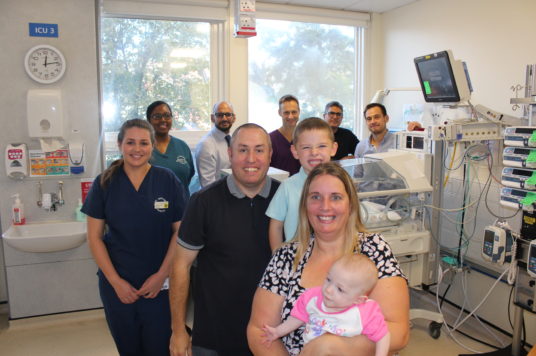Baby who survives after heart stops beating for 22 minutes turns one
A baby born more than three months prematurely, and whose heart stopped beating for 22 minutes in emergency surgery at five days old, celebrates her first birthday today (17 October).
Lacey Sherriff was born at 27 weeks gestation via an emergency caesarean section at St Peter’s Hospital last year before being transferred to St George’s five days later for urgent specialist surgery and care.
Lacey, who weighed 639g (1.4lbs) at birth, underwent the surgery to treat a severe condition affecting pre-term babies called necrotising enterocolitis, or NEC.
During surgery, Lacey had a cardiac arrest and her heart stopped beating for 12 minutes, due to excessive bleeding, before doctors managed to stabilise her. The team, however, feared the worst when their efforts to resuscitate her during a second 10 minute arrest proved challenging.
Her parents, Louise, 39, and Philip, 41, started to prepare themselves to say goodbye when Dr Donovan Duffy, Consultant Neonatologist, told them that Lacey had pulled herself through and was now more stable, though very unwell.
For the next 72 hours, the neonatal team took an hour-by-hour approach to assess whether she was going to recover from the events of the surgery. She slowly improved day by day but then deteriorated again at 13 days old requiring further specialist surgery to investigate recurring NEC signs.
The surgery revealed that it wasn’t recurring NEC signs, but instead her stoma – similar to a colostomy bag, which had been fitted during her first surgery – wasn’t working as it should. Surgeons were able to resolve the issues and the surgery was a success.
After 111 days in hospital, and a three hour round trip for Lacey’s parents every day, Lacey was well enough to be discharged home on 3 February 2018. She then underwent surgery to reverse the stoma last month, which was successful.
Lacey’s mum, Louise, said: “It was incredibly scary having an emergency c-section but it was the only option to give Lacey a fighting chance of survival, but then for her to then be so unwell to be rushed to St George’s at five days old for surgery. At this point, I still hadn’t been able to hold my baby and the thought of her having surgery was terrifying.
She added: “The hardest thing was that we didn’t know what would happen but I knew she had everything and everyone she needed around her doing their best. There was nothing else anyone could do.”
“We didn’t think she’d survive surgery and thought we’d be registering Lacey’s birth and death certificates at the same time. It was such a rollercoaster of emotions first thinking we’d be going home as a family of four, to three, then back to four again.”
Dr Thomas Breen, Consultant Anaesthetist at St George’s who led the theatre and resuscitation team, said: “Undergoing major surgery at such a young age, especially as a premature baby, has its risks but Lacey had minimal chance of survival without.
He added: “There were lots of people in the theatre that night – from myself and the anaesthetic team to the surgical, nursing and neonatal staff – all to give Lacey the best chance. The operation was going well, but she deteriorated and we started to fear the worst, but we didn’t give up.
He added: “Lacey is clearly a fighter, we supported her in every way we could but she was the one to pull herself through – defying all the odds. She truly is a remarkable little girl and it’s so great to see her doing so well now.”
Dr Donovan Duffy, Consultant Neonatologist, explained: “Necrotising enterocolitis causes the bowel to become very inflamed and start to die. Roughly a quarter of babies with NEC need surgery to remove the diseased bowel and unfortunately a third of those operated on won’t survive.
He added: “It’s remarkable Lacey is so well now as the mortality risk is much higher in the smallest babies like she was and considering what happened in surgery with her prolonged resuscitation. The doctors, nurses and support staff who cared for her should be proud.”
Louise and Philip, who live in Ashford, are enjoying being back at home as a family of four with Lacey and their five-year-old son Alfie.
Louise said: “Family life was difficult for the four months that Lacey was in hospital and I was blown away by the support provided at St George’s not least for Lacey’s clinical care, but for the support my husband and I received to help with the things you don’t automatically think about such as parking and petrol costs – those little things made a real difference.”
She added: “Each day, I’d take Alfie to school, then drive up to St George’s and spend the day with Lacey before rushing home to put Alfie to bed in an evening – that’s when my husband would see Lacey. I wanted to be with her 24/7, but my son also needed me, and I needed him, so it was important to keep some normality. I knew she was in safe hands – the best hands.”
Louise said: “My daughter wouldn’t be celebrating her first birthday if it wasn’t for the staff at St George’s. The care from the moment we arrived to when we left was phenomenal. I can’t fault it.”
Mr Zahid Mukhtar, Consultant Paediatric Surgeon at St George’s, said: “It’s absolutely fantastic to see how well Lacey is doing now. It truly was a multidisciplinary effort from everyone in the operating theatre to neonatal staff – and of course Lacey herself and her family.
He added: “She’ll continue to have follow up appointments, but she should develop and live a normal life, which is excellent news. Happy first birthday, Lacey – the miracle baby!”
Notes to editors
For more information, please contact Pippa Harper, Media Manager, on philippa.harper@stgeorges.nhs.uk or 020 8266 6128.


